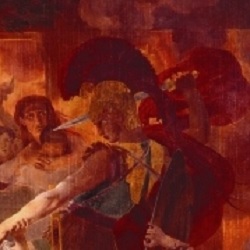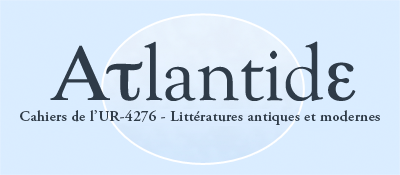 The So-called “Vogue” for Outdoor Theatre around the Time of the First World War : Meanings and Political Ambiguities of the Reference to Greek Theatre
The So-called “Vogue” for Outdoor Theatre around the Time of the First World War : Meanings and Political Ambiguities of the Reference to Greek Theatre
[Publication en ligne : 20 mars 2017]
Résumé : Cette étude part d’un double constat, d’une part, celui d’une rémanence conséquente de la référence au théâtre grec à la fin du XIXe et au début du XXe siècle, à travers ce qu’on a appelé la « vogue » des théâtres en plein air ; d’autre part, celui d’une double dimension, esthétique et politique, perceptible dans cette référence, puisque revenir au théâtre grec passe également alors, semble-t-il, pour une tentative de retour à l’assemblée démocratique. Dans ce cadre-là, le théâtre antique d’Orange fait figure de paradigme, depuis la représentation d’Œdipe-Roi, interprété par Mounet-Sully en 1888, et qui reste dans les mémoires comme une représentation charnière. Mais la fascination pour le « dehors », qui s’exprime dans les premières décennies du siècle, n’est pas dénuée d’ambiguïté et de paradoxes. Cette vogue du plein air prend place dans une période politique marquée, sur le plan théorique, par les débats entre cosmopolites et nationalistes, par le développement de l’idéologie maurrassienne, et sur le plan historique par le souvenir de la défaite de 1870, par l’affaire Dreyfus, et par la rupture constituée par la Première Guerre mondiale. Il s’agit donc ici d’étudier les échos entre les évolutions politiques de l’époque (notamment autour de la question du nationalisme) et ce phénomène théâtral du plein air, à partir, notamment, des discours relayés par la presse de l’époque. La « renaissance » d’Orange présente en effet des contours idéologiques marqués : la rhétorique de la nature, l’exaltation de l’esthétique classique contre les attaques de la modernité, et enfin la volonté perceptible de construire, sur la scène d’Orange, via un retour aux origines pour partie fantasmé, une forme d’épopée nationale, en sont les principaux traits. À une époque où l’équilibre entre « nationalisme républicain » et « nationalisme des nationalistes » est en train de se repenser, le mot de Louis XIV pour désigner Orange semble résonner tout particulièrement : en désignant le mur de scène comme « la plus belle muraille de [son] royaume », le monarque nous invite à comprendre les guerres (idéologiques, historiques, esthétiques) que ce lieu a pu cristalliser.
Mots-clés : Gabriel Boissy, Grèce antique, mythe, nationalisme, Orange, Première guerre mondiale, théâtre en plein air, théâtre grec, tragédie.
Abstract : This study takes two facts as a starting point : on the one hand, the persistent reference to Greek theatre at the end of the 19th century and beginning of the 20th century, especially through what will shortly be called a ‘vogue’ for outdoor theatres ; and on the other hand, the both political and aesthetic dimension of this reference. Indeed, Greek theatre seems to be understood as a model of a democratic assembly, which some therefore are trying to rebuild. In this understanding, the antique theatre of Orange can be seen as a paradigm, mostly since the performance of Mounet-Sully playing Œdipus in Oedipus the King in 1888, which is remembered as a turning point. But this fascination with the ‘outside’ is not deprived of certain ambiguities and paradoxes. The period we are studying is politically marked by the development of conservative ideologies, personified most notably by Charles Maurras but also noticeable in all the debates between different understandings and experiences of nationalism. On an historical level, the period is also marked by the memory of the 1870 defeat, the Dreyfus ‘Affaire’ and the breaking point constituted by the 1st World War. Therefore, this study will try to show how the political evolutions of the time, mostly through the question of nationalism, echo this phenomenon of outdoor theatre. We will rely mainly on press clippings for this study, in order to reveal the type of discourse surrounding the phenomenon. The ‘renaissance’ of Orange has a solid ideological foundation : its main characteristics are the rhetoric of nature, the exaltation of classicism against modernity, understood as an attack, and, lastly, the will to stage in Orange, through a return to origins which is partly a fantasy, a ‘national epic’. At a time when the balance between different kinds of nationalism is being reconsidered, the words of Louis XIV are particularly meaningful : he said once that the outside wall of the Orange theatre was ‘the most beautiful rampart in his kingdom’. Saying this, he induces us to understand the wars (ideological, historical and aesthetical) which have sprung up about this place.
Keywords : Ancient Greece, First World War, Gabriel Boissy, Greek theatre, myth, nationalism, outdoor theatre, Orange, tragedy.
Pour citer cet article : Géraldine Prévot, « The So-called ‘Vogue’ for Outdoor Theatre around the Time of the First World War : Meanings and Political Ambiguities of the Reference to Greek Theatre », Violence tragique et guerres antiques au miroir du théâtre et du cinéma (XVIIe-XXIe siècles), Tiphaine Karsenti et Lucie Thévenet (dir.), Atlantide, n° 6, 2017, p. 21-30, http://atlantide.univ-nantes.fr
Articles dans le même numéro :
Avant-propos - Christian Biet & Fiona MacintoshIntroduction - Tiphaine Karsenti & Lucie Thévenet
Ancient Tragedy Violence in the French Translations of Greek Tragedies (1692-1785)
Aeschylus’ Persians to Denounce Modern Greek Politics
Ancient Drama and Contemporary Wars : the City Laid Waste ?
War, Revolution and Drama : Staging Greek Tragedy in Contemporary Portugal
To Tell the Trojan War Today : Contemporary Performances of Agamemnon
Filmic Analogies : the Trojan War in the Present. Notes toward an African Oresteia (Pier Paolo Pasolini, 1969), Troy (Wolfgang Petersen, 2004)
The Obscenity of Violence, the Obscenity of Theatre. The Dramaturgy of Carmelo Bene’s Last performance disconcertment
Kleist’s Penthesilea : a Warrior Caught up by Tragedy
Volume intégral - Violence tragique et guerres antiques au miroir du théâtre et du cinéma (XVIIe-XXIe)
&


